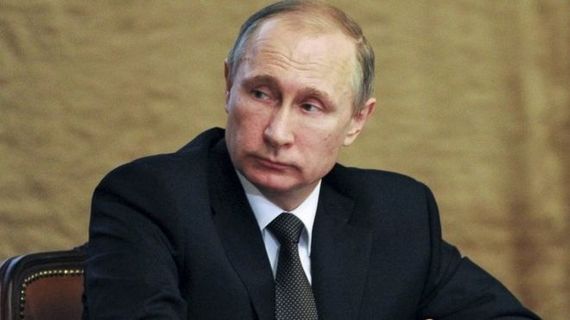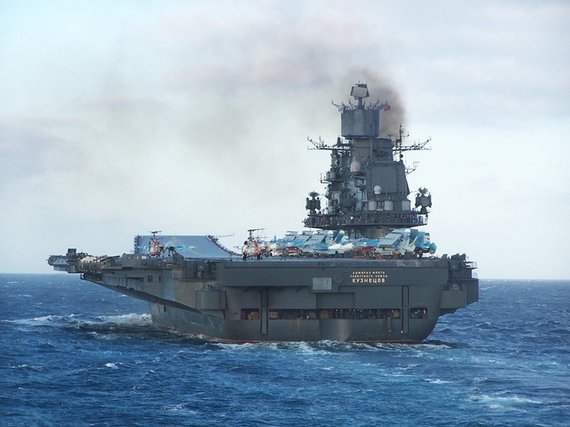It is fair to say that Russia is doing its best to be the biggest thorn in the side of the US and NATO in recent years. It is almost as if they were offended by how little attention the world was paying to them in the 90s and early 2000s, after the West spent half a century fearing and dreading them. And now they are doing their best to frustrate and annoy "Western interests" wherever they find them.
President Putin likes to claim that this is purely defensive, of course. In the wake of the collapse of the Iron Curtain, the Western sphere expanded substantially into what Russia used to regard as its own back yard, and most of the countries of the Warsaw Pact have been absorbed into NATO and the European Union. So his rhetoric always portrays the West as the aggressor against "natural" Russian interests.
Now of course, this only makes sense in a world view in which Russia is still a major power that is a "natural" competitor to the United States. And someone like Vladimir Putin, a former KGB agent who still nurses a deep nostalgia towards the "glorious past" of the Soviet Union, would certainly like to hope that this is still the case.
Yet this narrative ignores two things. The first one is that the US and NATO did not muscle into Russia's former satellites, but rather they were begged by those countries to expand to include them. The Baltics, Poland and the Vishegrad countries, Romania, Bulgaria and the rest of the Slavic Balkans were not stolen by the West. They took the first opportunity to flee the Russian yoke that history afforded them. Indeed, the Lithuanians and, most famously the Hungarians, tried to move out of Russia's "natural sphere of interest" long before, with tragic consequences. Nor has NATO more recently tried to muscle into Georgia or Ukraine. Once again, it was peoples that have had enough of Russian domination that tried to choose a different path.
And the second is that the only thing that makes Russia a power is the fact that it has the largest nuclear arsenal in the world. Were it not for this arsenal, any one of the UK, France or Germany could check Russian military adventurism on their own. To say nothing of the US or China. And indeed, Russia needs to throw its military weight around because it does not have much else going for it. The old ideological underpinning of empire, Communism, is gone, replaced instead with crude ethnocentric revanchiste nationalism. And the former industrial and scientific might of the Soviet colossus has been reduced to rubble, replaced by a narrow natural resource-driven economy, controlled by a restricted clique of the President's friends, while independent entrepreneurialism is either quashed through local political corruption, or absorbed into the black economy.
In other words, the economy is in the doldrums, and nobody in Russia is even attempting to address this issue. Rather, even as it is facing some of the toughest economic conditions since the 90s, the state is pumping whatever surplus it can still squeeze out of the energy industry into military spending, with lavish updates of materiel, a boost to nuclear stockpiles (as if Russia did not already have enough warheads to destroy the planet several times over), and continued operations in Ukraine and Syria.
But the poor state of the Russian military was evident in December 2011, when Russia deployed the aircraft carrier Admiral Kuznetsov to the Syrian coast. The U.S. Navy's Sixth Fleet was forced to keep a close eye on it in case it actually sank, and a rescue operation was needed to arrest dangerous material floating around or sinking into the sea. In fact, one former US General told me that a single US Super Aircraft Carrier Group could obliterate the entire Russian navy, as their equipment is so dated and technology obsolete. Such is the sorry state of this once great power.
Now, to be sure, Putin is an extremely talented tactician. With such limited resources he has done much more than anyone in the West could have expected to promote Russian interests and project power, even as the US has been cautiously withdrawing from international intervention. But that does not change the fact that Russia is dangerously overextended. And as far as we can see, there is nothing to indicate that their situation will get any better any time soon. In these circumstances, Putin's luck will run out, and sooner rather than later. The major concern for us in the West is not what Putin goes around doing now so much as what might happen with the inevitable correction occurs. Because anything less than a perfectly orderly transition to a new regime in Russia could spell catastrophe not only for the country, but for the entire world. An unstable Russia without a state strong enough to secure its nuclear stockpile will very quickly bring back to the fore the worst fears of the Cold War.


